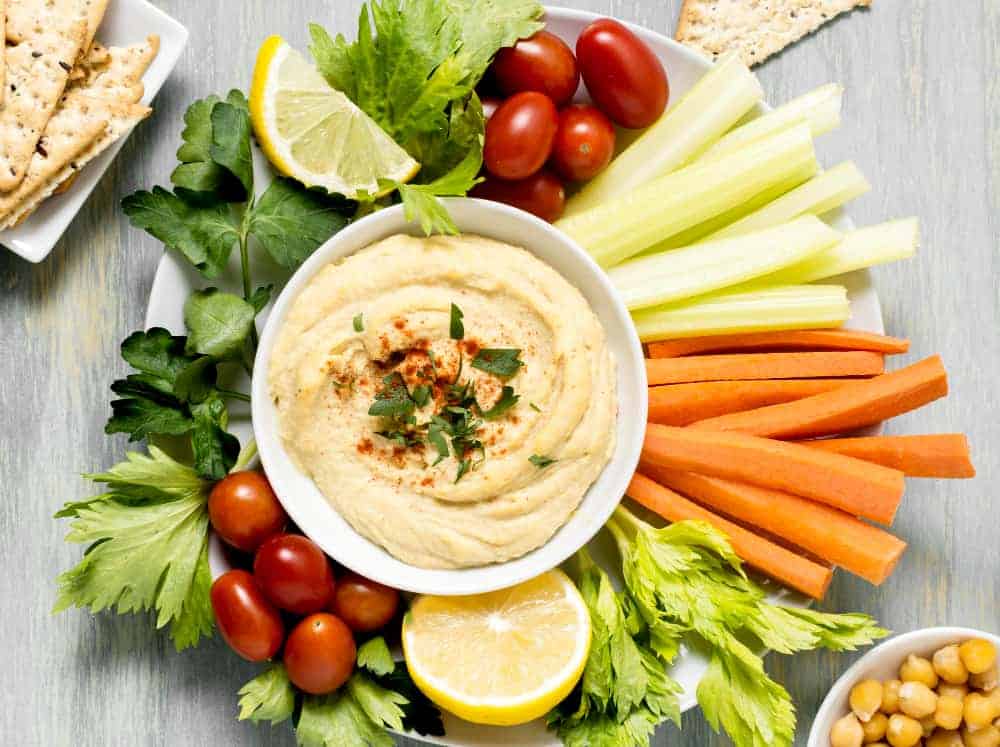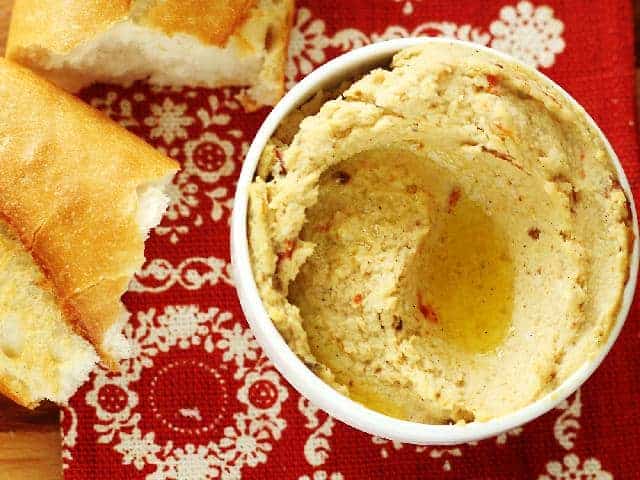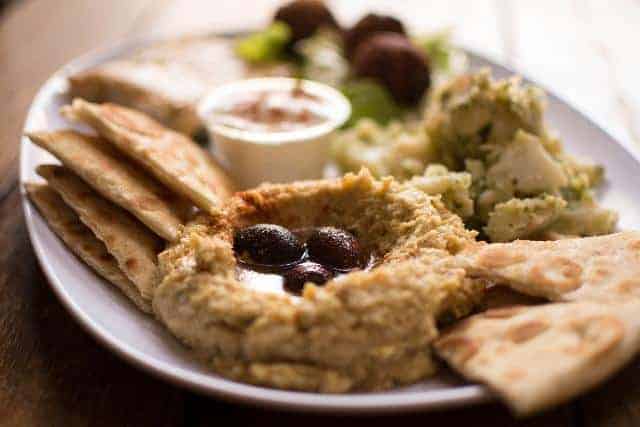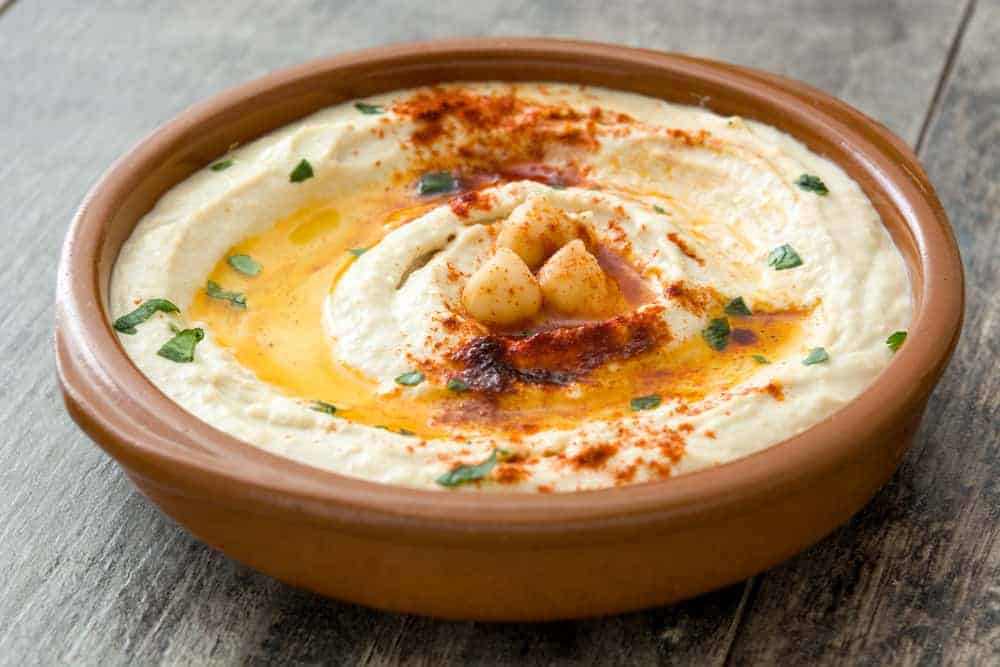Nosta Restaurant
Ancient Superfood Hummus – the much loved dip
Published on:
September 21, 2021

Hummus is one of the best dips in the world. And it is becoming more popular every year. In 2020, for example, hummus had a global market value of $811.9 million. Statisticians predict that the market value of hummus will increase to $1021 million by 2026 due to its ever-growing adoption.
Hummus did not become famous by sheer luck. It has many things worth loving. The spread with dip is a nutritional powerhouse with plant-based protein, fibre, vitamins, phosphorus, magnesium, iron, folic acid, zinc, and potassium. It will keep you healthier
for lunch.
In addition to nutrients, hummus is free of harmful sweeteners, fats, flavours, preservatives and colours. The homemade version is a healthy blend of chickpeas, garlic, tahini, olive oil, lemon juice and salt. This means that eating hummus will not affect your health.
Etymology of Hummus

Hummus is an Arabic name meaning chickpeas. The dip got its name simply because it contains chickpeas as one of the main ingredients. The English dictionary recognised hummus as an English name in the 20th century.
The History of Hummus, Why is it so Popular?

Hummus has been around for several centuries, and no one knows its exact origin. People in Palestine, Israel, Syria, Lebanon, Egypt, and other countries in the Middle East claim hummus as their national dish. Each of these countries believes that their ancient cooks made the hummus
outside.
In fact, there have been several "Hummus Wars" between these countries. In 2008,
Lebanon sued Israel for marketing hummus as its product. The Lebanese government then petitioned the EU to document hummus, tabbouleh and
falafel as traditional Lebanese foods. The petition was unsuccessful.
In 2009, after the petition failed, Lebanon's tourism minister devised a plan to promote hummus as a Lebanese dish. He organised a team of chefs who served 2000 kilogrammes of hummus on a large plate. The large portion was recognised and documented in the Guinness Book of World Records.
The world record did not go down well with Israel. Israeli chefs then made 4000 kilogrammes of hummus, which was served in a satellite dish 6.5 metres in diameter. Lebanon countered with 10452 kg of hummus, which still holds the record today.
Surprisingly, neither country owns this popular spread. Historians found the earliest documented recipe in a 13th-century recipe book published in Cairo, Egypt. Ancient hummus was a puree of chickpeas, garlic, preserved lemons, vinegar and other local herbs. It did not contain tahini.
Moreover, food historians found a similar recipe in another Egyptian cookbook titled 'Kitab Was al-Atima al-Mutada'. The hummus in this recipe book is cream of chickpeas, tahini, regional spices and nuts. It did not contain garlic or lemon juice.
Given these two recipes, many agree that hummus could have been made in Egypt. Other historians still believe that the ancient recipes are not enough to call Egypt the home of hummus.
Regional preparations of hummus

Many countries share a name with a hummus variant that identifies with their regional ingredients and culinary culture. For example, some regions use butter instead of olive oil, while others use yoghurt instead of tahini. Some of the common regional preparations you may be familiar with are:Turkish hummus
Turkish hummus differs from regular hummus in a few ways. It contains more tahini than chickpeas, which is why it has a stronger sesame flavour. Also, Turkish hummus contains butter instead of olive oil. Turks serve their hummus as an appetiser or as a side dish with falafel.Israeli Hummus
Israeli hummus is made according to the original recipe. Israeli cooks make it with chickpeas, garlic, lemon, cumin, olive oil and tahini. Israelis consider hummus their national dish, and there are even Cork restaurants that specialise in making and serving hummus.Lebanese Hummus
Lebanese foodies prefer their hummus with powdered sumac berries, ground meat, nuts and vegetables. As for the composition, the Lebanese prepare their hummus with tahini, chickpeas, garlic, lemon juice, olive oil and cumin.Syrian Hummus
Syrian hummus is no different from Lebanese, Egyptian and Israeli hummus. However, Syrians serve it with fried chickpea patties and falafel. They also do it with other local dips. In Syria, mezze platters are never complete without hummus.Palestinian and Jordanian Hummus
Hummus is a staple in Jordanian and Palestinian households. Palestinians and Jordanians garnish their hummus with peppers, parsley and mint. They use hummus as a spread on bread, and others serve it warm as a dish for dinner. In some cases, they use yoghourt as an alternative to tahini.USA, Great Britain and other parts of the world
In the UK, US and other parts of the world, hummus is made and sold commercially. Although it is made with chickpeas as the main ingredient, shop-bought hummus contains a number of thickeners, preservatives, and flavourings. Takeaway about Hummus
Hummus is not popular just because. But there are several reasons why it is one of the best dips and spreads. It is made from all-natural ingredients like chickpeas, tahini, garlic and lemon juice. It is free from harmful ingredients.
Hummus is rich in vitamins, proteins, fibre and minerals and can improve your health in amazing ways. It lowers cholesterol, supports the body's immune system and reduces the risk of chronic diseases like high blood pressure.
Frequently asked questions
Is it recommended to eat hummus every day?
There is no doubt that hummus, especially when made at home from chickpeas, tahini, olive oil, garlic and lemon juice, is very nutritious. It has less carbohydrates, calories, sugar and other harmful ingredients.
However, experts warn against eating large amounts every day.
And why? This dip is rich in soluble fibre. When consumed in large quantities, hummus can cause stomach upset, gastrointestinal inflammation and diarrhoea.
In addition, eating hummus on a daily basis can increase your calorie intake. As a result, you might gain excessive weight and increase your risk of diabetes, atherosclerosis, obesity, heart disease, and high blood pressure.
Therefore, it is best to consume this mystery cream of chickpeas in moderation.
To be on the safe side, experts recommend
limiting hummus consumption to no more than five tablespoons.
What are you eating hummus with?
This mystical cream of chickpeas goes well with many dishes. You can eat it with fresh pita bread, cucumber salad, regular bread, mashed potatoes, eggs, falafel, fish, sliced fruits, rice crackers, tortilla crisps, sandwiches, pizza and pasta.
Does hummus make you fat?
Eaten in moderation, hummus does not make you fat. Instead, it can help you shed excess body fat. How. The fibre in hummus keeps you feeling full for several hours. This means you will not feel the urge to eat high-calorie snacks and foods. Hummus is also a rich source of good fats, a type of fat that supports weight loss.
However, eating large amounts of hummus can still lead to weight gain. The few calories in this spread can skyrocket if you eat more hummus every day.
Is hummus good for your liver?
Hummus is undoubtedly good for your liver. It contains no sugar, trans fats, alcohol, salt, and other ingredients considered harmful to the liver. Instead, this savoury dip is rich in fibre, a dietary ingredient that supports liver function, and monounsaturated fats that lower blood cholesterol levels.
Does hummus help lower cholesterol?
Chickpeas, the main ingredient in hummus, are rich in fibre, cholesterol-friendly proteins, good fats, and phytosterols. These nutrients play a synergistic role in lowering blood cholesterol levels.
Does hummus need to be stored in the refrigerator?
Homemade hummus is very perishable. It will go rancid quickly if stored at room temperature. So if you want your dip to stay fresh for a long time, you should keep it in the refrigerator below 40 degrees Fahrenheit.
What are the health benefits of hummus?
Hummus is made from chickpeas, garlic, lemon, sesame seeds and olive oil and has several health benefits. No wonder it is one of the healthiest dips or appetisers you can find around.
Some of the direct health benefits associated with this dip are:
Improved immunity
Reduction in inflammation
Improved digestive health
The normalisation of blood sugar levels
Reduced risk of heart disease
Reduced body fat
Strong bones
Improved skin health
Lower cholesterol levels
Lower risk of cancer
Can I eat hummus while on the keto diet?
The ketogenic diet cuts out carbs and focuses on eating more protein and high-quality baked goods. Therefore, hummus could be a great addition to your keto diet, as it contains adequate protein from chickpeas and fat from olive oil.



